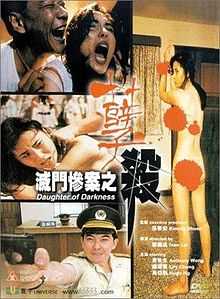Daughter of Darkness (1993 film)
| Daughter of Darkness | |
|---|---|
 | |
| Directed by | Kai-Ming Lai |
| Written by | Kai-Ming Lai |
| Starring |
Lily Chung Monica Lo Anthony Wong |
| Cinematography | Kin Keung Lee |
Release dates |
|
Running time | 96 minutes |
| Country | Hong Kong |
| Language | Cantonese |
Daughter of Darkness (Chinese: 滅門慘案之孽殺; pinyin: Mie men can an zhi nie sha) is a 1993 Hong Kong Category III horror film directed by Kai-Ming Lai. The film was released on 28 October 1993 in Hong Kong and was considered to be a sleeper hit.[1] It starred Lily Chung as a young teenager who is suspected of murdering her family after years of enduring horrific abuse by them.[2]
The film was followed with two sequels, the 1994 films Daughter of Darkness 2 (Mie men can an II jie zhong) and Brother of Darkness (Ti tian xing dao: Sha xiong).[3] While Chung did not return for Daughter of Darkness 2, she did return for Brother of Darkness.
Synopsis
Set in a small village in China, a beautiful young seamstress, Mak Wei-Fong (Lily Chung), arrives at a police station to report the mass murder of her family. The police detective, Leoi Gei (Anthony Wong) investigates the murder and discovers that both of Mak's parents have been shot to death. Leoi also finds that the bullets used are the type that only a police officer would carry. He immediately suspects Mak’s boyfriend Gin, who is a young police officer on the force. When confronted by Detective Leoi, Gin confesses to the crime without hesitation. Detective Leoi places Gin under arrest, but because of Gin's quick admission and confession, Detective Leoi suspects that Gin may be sacrificing himself in order to protect the true culprit. Mak soon arrives at the police station, confessing that she in fact is the murderer, and Gin's confession was only done to protect her.
During the interrogation, Mak reveals that her home life was abusive. She pleads that both of her parents (Ka-Kui Ho and Daisy) were promiscuous and each had many illicit affairs outside of their marriage. She explains that her siblings were unsympathetic and provided no family support. Mak tells the Detective Leoi that Gin's comfort and love had given her the strength that was not present in her family dynamic. The detective learns that Mak and Gin had been planning to get married and move to Hong Kong. He continues with his interrogation, where Mak explains that she had been raped by her own father, and her family had knew, but did nothing. Mak’s father had even gone so far as to arrive at Mak's work place in an attempt to blackmail her by telling her boyfriend Gin about the rape. After returning home from work, Mak attempts to kill her father with a pair of scissors. She hopes to silence him and keep the rape a secret from Gin, but she fails, and he overpowers her. Once overpowering her, Mak’s father retaliates by tying Mak up, stripping her naked, and sodomizing her. Gin arrives in time to witness this and attempts to stop Mak's father. Gin becomes enraged and beats the father but stops short of murdering him, in large part due to his training as a police officer. Gin ceases fighting with Mak's father and focuses his attention on Mak. Mak's father regains consciousness, sneaks up on Gin and knocks him unconscious. During this struggle, Mak successfully grabs Gin's gun and shoots and kills her father. Mak then kills her family members as they arrive home.
The court sentences Mak to the death penalty, which is in accordance with the law for The People's Republic of China. Mak gives birth to a baby girl in prison (whose father’s identity is ambiguous due to the time of conception). Gin and the baby arrive to say goodbye as Mak meets her fate, leaving them both heartbroken as they mourn for Mak when they watch her die.
Cast
- Yuk-kwan Chan
- Lily Chung as Mak Wei-Fong
- Daisy as Fong's Mother
- Biu Gam as (as Piao Chin)
- Ka-Kui Ho as Wei-Fong's Father
- Si Man Hui as Gossiping Woman
- Lo Hung as Ping
- Wong Kam Hung as Gambling House Suspect
- William Ho Ka-Kui as Papa Mak
- Che Kau-Wa as Policeman
- Wan-fei Lee as Villager at Police Station
- Kai Chi Leung as Fung
Reception
HorrorNews.net gave a favorable review, but warned that the movie contained some content that could be unsettling for some viewers.[4]
References
- ↑ Hong Kong. Urban Council (1997). Fifty years of electric shadows : Hong Kong cinema retrospective, Volume 21, Issue 2. 市政局. p. 121.
- ↑ Grossman, Andrew (2000). Queer Asian Cinema: Shadows in the Shade, Volume 39, Issues 3-4. Harrington Park Press. p. 185. ASIN B000KA5NMK.
- ↑ Charles, John (2000). The Hong Kong Filmography, 1977-1997. McFarland. pp. 514, 762, 814. ISBN 0786408421.
- ↑ "Film Review: Daughter of Darkness (1993)". HN.n. Retrieved 14 January 2014.